To play Dungeons & Dragons, you'll need to create a character to take on adventures that your Dungeon Master will run. Even before choosing your class, you'll select a race for your character.
Fifth-edition D&D contains a wide variety of ancestries to choose from, and each one offers different features that make your character unique. If you are new to the game, the best place to start reading about the game's races is in the free basic rules or the Player’s Handbook (if you want slightly more options). As you grow more familiar with the game, you can look to other books for additional character creation options. For example, Tasha’s Cauldron of Everything adds rules for customizing your race. For the sake of this tutorial, we'll cover just the racial options in the Player's Handbook.
Select a race to learn about it |
|
| Dragonborn | Halfling |
| Dwarf | Half-orc |
| Elf | Human |
| Gnome | Tiefling |
| Half-elf | |
Sign up to start making your character
D&D Beyond is an official digital toolset for Dungeons & Dragons. Your free account allows you to use the character builder, which walks you through the process of making a D&D character. If your Dungeon Master has a Master-tier subscription to D&D Beyond, they can share books they have purchased in the marketplace with you. This is handy if you want to explore races, subraces, and optional rules found outside of the basic rules but aren't ready to buy anything in the marketplace.
Dragonborn
Dragonborn are descendants of mighty dragons and are typically depicted as strong martial heroes who deeply value their clans. They are reptilian-like and get a breath weapon based on the type of dragon their lineage is tied to. Want to breath fire on your enemies? Then you might want to play a dragonborn whose bloodline comes from red dragons!
Great reasons to play a dragonborn:
- You get to be a quasi-dragon. Sure, you don’t have wings, but you’re still draconic!
- Dragonborn have breath weapons. Depending on your draconic ancestry, you can choose from a wide variety of breath types, ranging from the traditional fire breath of red dragons to the poison breath of green dragons. Your breath deals 2d6 damage on a failed save (the DC is 8 + your Constitution modifier + your proficiency bonus), half as much on a successful save, and slowly scales as you level up.
- Dragonborn are resistant to the damage type associated with their ancestry. So, if you breathe fire, you’re resistant to fire damage.
Dragonborn players should keep in mind:
- Dragonborn don’t have darkvision, which regular dragons and most other races in the Player’s Handbook possess.
- The dragonborn’s breath weapon uses up an entire Action and can only be used once per short or long rest. Some players argue that its damage output is weak, especially when foes make their saving throws.
Dwarf
Dwarves in D&D possess a knack for mining and a love for their clans and kingdoms, which stretch far into the earth. All dwarves are great for martial classes, though dwarven spellcasters are also common. The subraces in the Player’s Handbook include the hill dwarf and the mountain dwarf. Hill dwarves boast a higher Wisdom score and hit points. Mountain dwarves benefit from greater Strength.
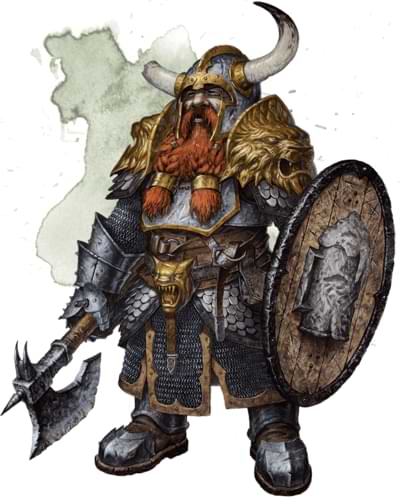 Great reasons to play a dwarf:
Great reasons to play a dwarf:
- Dwarves can take a lot of damage. Their Constitution score increases by 2, and Dwarven Resilience gives them advantage on saving throws against poison and resistance to poison damage. The Dwarven Toughness trait of hill dwarves also imparts a hit point maximum increase of 1 with every level.
- Dwarves start with many weapon proficiencies that other races lack, including hard-hitting armaments like the battleaxe and warhammer. Even a dwarven wizard who is out of spell slots won’t be rendered helpless as long as a good hammer is nearby.
- If you’re setting out on a dungeon crawl campaign like Waterdeep: Dungeon of the Mad Mage or an underground adventure like Out of the Abyss, a dwarf is a handy choice thanks to their darkvision and their Stonecunning trait, which lets them discern the origins of stonework.
Dwarf players should keep in mind:
- While dwarves make good druids, clerics, and wizards, if you want to play a warlock or sorcerer, keep in mind that dwarves don’t get a bonus to Charisma, which is important for those classes.
- With a speed of 25 feet and an emphasis on Strength and Constitution rather than Dexterity, dwarves are less nimble than other races.
Elf
Elves are D&D’s longest lived race. Most elves possess an ethereal beauty reminiscent of the Feywild, as well as the potential to excel in both martial and magical pursuits.
There are three elven subraces in the Player’s Handbook: high elves, who specialize in magic; wood elves, who have a deep relationship with nature; and the drow, subterranean dwellers who have adapted to a world without light.
Great reasons to play an elf:
- Elves live for a really long time. An elf only reaches adulthood at 100 and lives until 750. Unless you’re playing a geriatric elf, this longevity means that certain monster effects which cause aging — like the ghost’s Horrifying Visage — are relatively harmless to an elf.
- Elves don’t need to sleep. They can benefit from a long rest from a mere 4 hours of meditation. This means you can spend more time at night keeping watch for enemies or doing other tasks.
- Two of the three elven subraces start with free magic. High elves can choose a wizard cantrip of their choice, while drow begin with the dancing lights cantrip and learn faerie fire and darkness as they level up.
Elf players should keep in mind:
- If you’re playing a drow, be aware of Sunlight Sensitivity, which causes disadvantage on attack rolls and Wisdom (Perception) checks in direct sunlight. The subrace’s long-standing status as “evil elves,” epitomized by the harsh culture of the drow city Menzoberranzan, is also something to be wary of, though the heroic Drizzt Do’Urden proves that noble drow are present and plentiful in the world.
- Like dwarves, elves are perhaps the most traditional of D&D’s races. Those used to the typical depiction of the aloof, distant elf who won’t interfere with the problems of the world might find these pointy-earned individuals boring. But the power is within your hands to create a unique character that defies all tropes.
Gnome
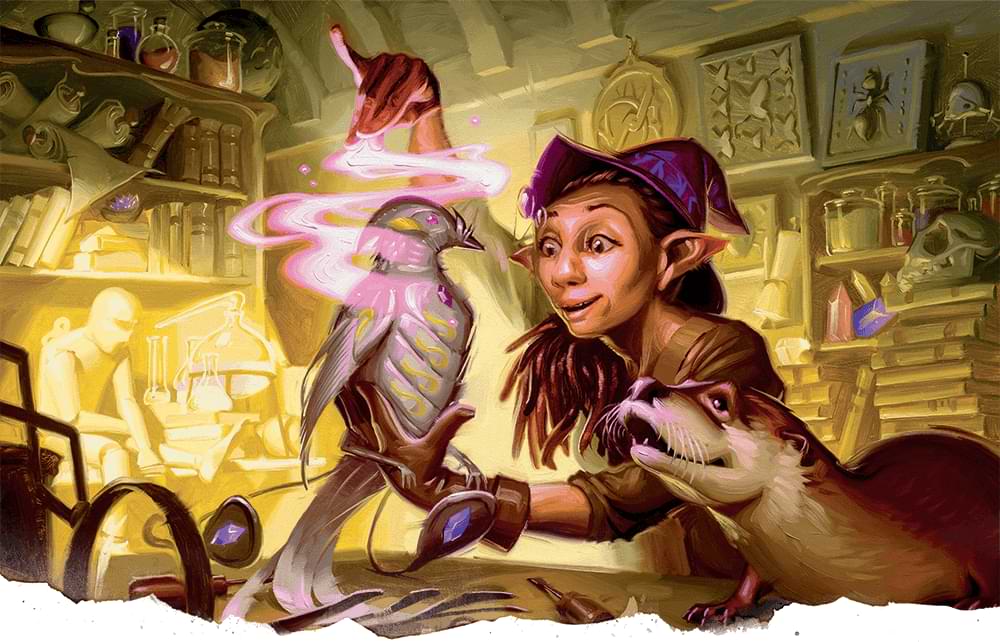
Gnomes are tinkerers, inventors, and lovers of life. They relish in making the most of their years, and out of all of the races in the Player’s Handbook, gnomes arguably possess the most infectious humor and fascination for the world.
Gnomes have two subraces. Forest gnomes dwell in woodland areas and befriend animals. Rock gnomes are inventive and expert crafters.
Great reasons to play a gnome:
- Gnomes have a number of solid traits right off the bat. They’re the second longest-lived race in the Player’s Handbook and have darkvision and Gnome Cunning, which grants advantage on all Intelligence, Wisdom, and Charisma saving throws against magic.
- Forest gnomes gain minor illusion as a free cantrip, a Dexterity score increase of 1, and the ability to speak with Small animals. These are all great traits for a ranger who dashes in and out of the woods or a druid who likes to commune with nature.
- Rock gnomes can construct several devices, including a clockwork toy, a fire starter, and a music box. These can serve as both flavorful roleplaying aids as well as handy tools for distracting enemies in the middle of a stealthy adventure!
Gnome players should keep in mind:
- Like dwarves and halflings, the gnome life means that you have to deal with a slow movement speed of 25 feet.
- Gnomes receive an Intelligence boost of 2, which is wonderful for wizards but less so for most other classes.
Half-Elf
Half-elves are one side of the “stuck between two races” fantasy trope. (Half-orcs are the other.) Half-elves are often not entirely accepted by humans nor their elvish brethren, but some manage to effortlessly exist within both worlds like the cultural chameleons they are. Importantly, this race is a good fit for most classes thanks to traits that reflect their human and elvish halves.
Great reasons to play a half-elf:
- Half-elves get the flexibility of humans alongside the Fey Ancestry and inherent darkvision of elves. This means they can’t be charmed or put to sleep by magic, have the ability to see in the dark, and start with proficiency in any two skills of their choice.
- Half-elves have great versatility thanks to their Ability Score Increase feature. They get a Charisma score increase of 2 — making them a fine fit for Charisma-based classes like bards and warlocks — and they can increase any two other ability scores of their choice by 1.
Half-elf players should keep in mind:
- Unless you're playing a spellcaster who relies on Charisma or want a character who is good in social encounters, the Charisma bonus could go to waste.
Halfling
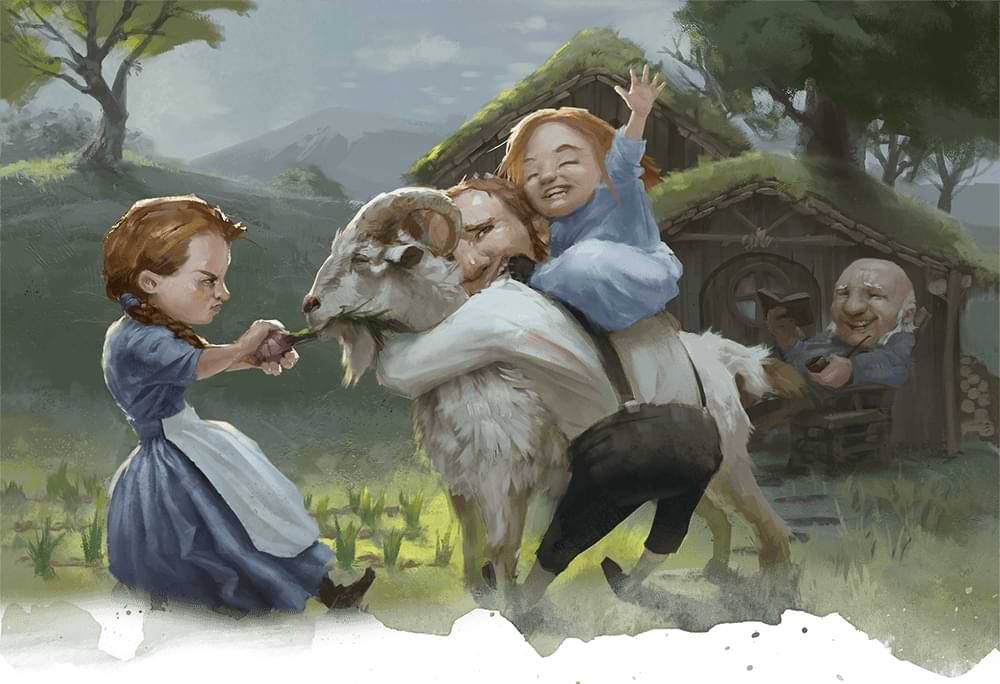
Halflings are gentle folk right out of The Hobbit who enjoy the pleasures of home. Halflings who do take to the road tend to be defenders of their communities or have wanderlust.
If you’ve ever dreamed of playing as Bilbo or Frodo Baggins, or perhaps want to roleplay a Small character who seeks to defy expectations in a big world, halflings are the race for you. There are two halfling subraces in the Player’s Handbook. One is geared more toward stealth, and the other is geared more toward hardiness.
Great reasons to play a halfling:
- Halflings can avoid catastrophic rolls thanks to their Lucky trait, which lets them reroll a 1 on the d20 for an attack, ability check, or saving throw.
- Halflings have advantage on saving throws against being frightened. Also, if you choose the stout halfling subrace, you’ll have advantage on saving throws against poison, and resistance to poison damage as well.
- Lightfoot halflings make great rogues thanks to their Naturally Stealthy ability, which lets them hide if they’re obscured by a creature one size larger. Combine this with the Halfling Nimbleness trait, which lets halflings move through any larger creature's space, and you’ve got an amazing little acrobat who can tumble all over the battlefield.
Halfling players should keep in mind:
- Like dwarves and gnomes, halflings’ small legs mean that they only have a walking speed of 25 feet. This lower speed will be noticeable if you're playing a melee character and need to close the gap on enemies.
Half-Orc
Half-orcs are the other side of the “stuck between two races” trope. Unlike elves, however, orcs have traditionally been painted as villains in D&D. More nuanced portrayals are present in fifth edition, but many half-orcs still carry a chip on their shoulder due to the way society treats their orcish side. For those who want to play as a martial powerhouse or delve into a character navigating a complex relationship with their heritage, half-orcs are the way to go.
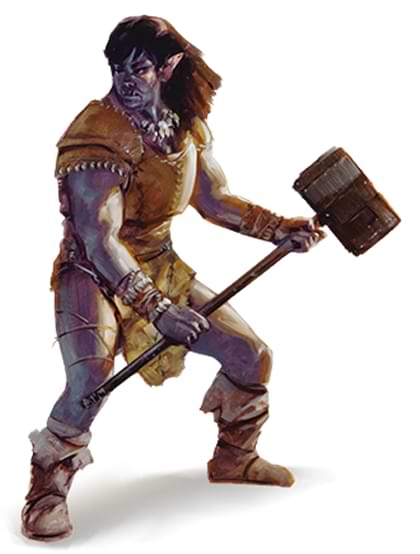 Great reasons to play a half-orc:
Great reasons to play a half-orc:
- Half-orcs are supremely hardy, and Relentless Endurance is one of their best traits. Once per long rest, if a half-orc falls to 0 hit points and isn’t killed outright, they can instead drop to 1 hit point. This ability can snatch victory from the jaws of defeat.
- Savage Attacks is another excellent trait that lets half-orcs roll a weapon damage dice an additional time and add it to the extra damage of a critical hit.
Half-orc players should keep in mind:
- Half-orcs in D&D are limited to human/orc hybrids, just like half-elves. Previous editions of D&D also hinted that many half-orcs were the result of unwilling unions — a disturbing lore choice that has largely been retconned these days.
- The Player’s Handbook says that half-orcs grapple with evil tendencies thanks to the lingering influence of Gruumsh, the god who created orcs. Players interested in half-orcs should be wary of this stereotype, and only engage with it if they want to.
- New players might wonder why full-blooded orcs aren’t listed as a race in the Player’s Handbook, since both elves and half-elves are present. The simple answer is that orcs have traditionally been the “bad guys,” and if you want to play one, you’ll need Volo’s Guide to Monsters or Eberron: Rising from the Last War.
Human
Humans are the most populous and self-explanatory race in D&D. Their brief lifespans in comparison to longer-lived races means that humans are often the movers and shakers who propel dramatic world events forward.
Humans might seem dull, but if you’re playing in a game where the Dungeon Master allows you to play a variant human, the ability to take a feat at 1st level is staggeringly good. Also, sometimes the best way to stand out in an adventuring group filled with all sorts of colorful creatures is to choose the seemingly “mundane” option!
Great reasons to play a human:
- Humans have solid stats across the board, with their ability scores each increasing by 1.
- Variant humans can forgo increasing each of their ability scores by 1 in favor of increasing only two scores by 1, and gaining one skill proficiency and a feat.
- The diversity of humans is unsurpassed, and their ability to fit into any D&D world makes them the most flexible race from a backstory-formulating perspective.
Human players should keep in mind:
- Humans don’t have any of the special traits that other races have. No magical breath, no innate magic, no long life, and no darkvision. In other words — they’re vanilla, especially in a game where variant humans aren’t allowed.
Tiefling
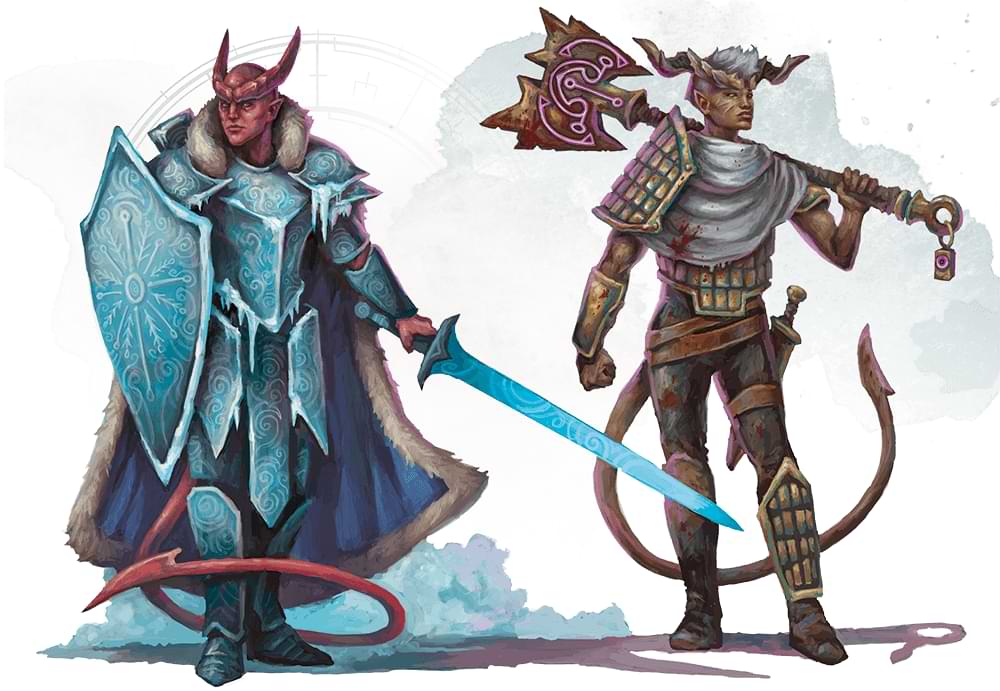
Tieflings are individuals with the blood of devils flowing in their veins, often due to pacts crafted between their ancestors and various denizens of the Nine Hells.
Typically boasting horns and tails that reveal their devilish origins, tieflings in many D&D worlds have to deal with the same troubles as half-orcs. Nevertheless, these children of Asmodeus are highly charismatic folk who usually manage to outwit others through charm or trickery.
Great reasons to play a tiefling:
- Thanks to their infernal bloodline, all tieflings have resistance to fire damage as well as darkvision — not to mention nifty horns and a tail!
- Tieflings get an Intelligence score increase of 1 and a Charisma score increase of 2, making them excellent spellcasters. The tiefling warlock or sorcerer is a common combination, as is the tiefling bard or wizard.
- Tieflings have an innate command of certain magics, beginning with the useful thaumaturgy cantrip. At 3rd level, they can cast hellish rebuke as a 2nd level spell, and at 5th level, they can cast darkness. Both spells can only be used once per long rest, but are excellent freebies.
Tiefling players should keep in mind:
- Although the Charisma and Intelligence bonus is handy for a lot of classes, the lack of a bonus to Constitution or Dexterity means that you're liable to be less hardy and less dexterous than other characters in the party.
- As with drow and half-orcs, tieflings might garner a certain amount of distrust in traditional D&D settings, and the Player’s Handbook states that many become bitter due to this prejudice and turn villainous. As always, remember that your tiefling character is whoever you want them to be — not what lore dictates.
Let's make a character
Once you've selected a race for your character, it's time to start thinking about their class. Will your human character be a fighter who has risen the ranks of the city guard? Will your elf be a druid who worships nature and protects it from wrongdoers? Check out the classes in the basic rules or in the Player's Handbook (for more options) to start learning about them.
If you'd like more direction for creating a character, here's a video on how to quickly make one using D&D Beyond. Below that, you'll see additional tutorial articles.
Jeremy Blum (@PixelGrotto) is a journalist, gaming blogger, comic book aficionado, and fan of all forms of storytelling who rolled his first polyhedral dice while living in Hong Kong in 2017. Since then, he's never looked back and loves roleplaying games for the chance to tell the tales that have been swirling in his head since childhood.








-
View User Profile
-
Send Message
Posted Sep 1, 2021Cool, but all I want to know is since I have hardcover books in real-life but not digital how do I get access to those sources?
-
View User Profile
-
Send Message
Posted Sep 1, 2021Hardcover books and digital books are different services. Owning one does not grant you access to the other, nor something like a code to get price reduction.
Yes, people have complained about this already. No, it's probably not going to change.
-
View User Profile
-
Send Message
Posted Sep 1, 2021It's useful exactly like he said to help keep watch, so you don't get ambushed, or during long rests to fill out your spellbound or other side jobs that happen in down time. It all depends how immerse your group gets with *ribbon* abilities
-
View User Profile
-
Send Message
Posted Sep 1, 2021"Probably"? Definitely not going to change.
-
View User Profile
-
Send Message
Posted Sep 1, 2021Good article. I hope these breakdowns are helping new players jump in.
Question: Will you be bringing back DM's guide, Running monsters, or Enounter of the Week? those were some of my favorite sources for DMing and just creative worldbuilding as a whole.
(I realize this probably won't get answered, but you can't blame a guy for trying ;)
-
View User Profile
-
Send Message
Posted Sep 1, 2021Shoot. I had 7 different hardcover books before I even made this account too.
-
View User Profile
-
Send Message
Posted Sep 1, 2021same. it sucks. but its a hard problem to solve without losing money
-
View User Profile
-
Send Message
Posted Sep 1, 2021They are not different races, they are different species...
-
View User Profile
-
Send Message
Posted Sep 1, 2021I'm currently DMing for a dwarf only party and it's a blast. They literally eat dragons for dinner.
What I'm saying is that as a party you can come up with a theme to play around and race can be a really cool theme, especially because it gives your DM some really cool options.
My party calls themselves Dwarvenite and are currently in the Dungeon of Death (second edition module I remade for 5th edition) which was originally an ancient dwarven mine.
It's all really thematic and makes for great moments.
-
View User Profile
-
Send Message
Posted Sep 2, 2021It would be nice if implications of penalties where none exist were removed when there exists only a flat 0 bonus. A flat 0 is a good thing. Please stop implying that no bonus is a negative thing.
-
View User Profile
-
Send Message
Posted Sep 2, 2021If you're saying what I think you're saying I totally agree. It's totally unnecessary to want to add negative modifiers to races. Let them have their 0s and bonuses
-
View User Profile
-
Send Message
Posted Sep 2, 2021You mean people choose to play races other than Dwarves? Weird.
I'm having fun with a Dwarven Sorcerer, who keeps forgetting he's a caster and charges in with his Warhammer :)
-
View User Profile
-
Send Message
Posted Sep 5, 2021Wizard's copying spells, any crafting really.
-
View User Profile
-
Send Message
Posted Sep 5, 2021No, actually it's a very easy problem to solve without losing money. Since a digital copy costs effectively $0 everyone who own a hard-copy of a digital product could receive any number of product keys on every digital service site without the service providers losing a single $
Stop counting "missed profits" as a loss. Yes if you buy a hardcover book you technically bought that book and from a different vendor while you purchase a digital service that handles the same content, but from a different vendor. I get that, but it's like purchasing Skyrim for the 5th time. It doesn't exactly feel right.
-
View User Profile
-
Send Message
Posted Sep 5, 2021Not really losing it so much as making it. All the people fed up with not having the online PHB or DMG end up buying in addition to their physical copies, thus buying the book twice. Makes more cash, no point in changing it if it does
-
View User Profile
-
Send Message
Posted Sep 7, 2021That's like saying that 'I bought the core game on XBOX so I deserve all the DLC for free as well as a free copy on PS and PC'. Yes, you bought the book. Yes, the digital book has all the same content. But they are two different forms of media that had to have 2 different lines of development (since this is not just some PDF file version of the digital content) to get that content to you. If you want the content in both forms of media then you need to buy it both times. Now they could do some kind of discount code in the back of the physical book maybe but then that becomes an issue of scamming, reselling, code genning, code theft, and a bunch of other crap that I sure as **** wouldn't want to deal with if I was them.
-
View User Profile
-
Send Message
Posted Sep 7, 2021In a way you are right. But as a natural consequence, well I don't want to own it in multiple forms. Very specifically I don't care to purchase the physical midia, so the books.
I enjoy the services DnD beyond provides and so whenever I purchase a book, I do so it here. If I own something already, my purchasing power to buy it again in a different form decreases. However I hardly think it's sensible to count that as a loss for the other vendors. So Amazon, Roll20, etc aren't losing money because I have the books here and not buying them elsewhere. If that were the case the lost amount of $ would be more than the earned. (for instance if 5 retailers sell same product for $20 I buy one so one retailer gains $20 while 4 loses the same amount totaling at -$60, which is dumb)
And this was my actual argument.
-
View User Profile
-
Send Message
Posted Sep 7, 2021Business is no where near as black and white as you seem to think it is. If you buy from 1 of 5 competing retailers then yes it is a lost sale to the other 4. Lost as in they didn't gain that $20 sale but also cause they lost the money they paid for the product (inventory costs) and expenses put toward that sale that is lost (advertisement, payroll, storage, ect). Your purchasing power is that you get to choose where you buy the product whether that's 1 retailer, all 5, or any number in-between. Just cause you bought it once already means you have less reason to buy it again but you don't lose purchasing power. That just means that one of the retailers you haven't bought from have to offer something enticing enough to make you buy it again which is still a use of your purchasing power. Or the retailers can strong arm you in buying it again (like roll20 being super difficult to use if you haven't bought content on their site) but either way they are trying to influence you to use your purchasing power and your almighty dollar to give them a sale so they don't lose the sale.
If Wizards just gave out codes for digital copies on roll20, DnDBeyond, and whatever with every physical book (and we assume that it goes perfectly with no code gens, code thefts, ect) then those sites would lose out on those sales and would now have an increased overhead of having to support you and the free content they just had to give you. That can be offset by Wizards and the sites coming to some sort of a partnership agreement in splitting sales but that is a costly and time consuming legal battle both getting the two sides into agreement but also down the road when they fall out of agreement.
And either way, this is extremely off topic for the content post and so I'm going to be leaving it there. Have a good day and continue to use your purchasing power by spending that almighty dollar however you feel is the best option for you.
-
View User Profile
-
Send Message
Posted Sep 7, 2021Guys, DnD already has so much math in it. Don't inflict self injury and do more
ultimately, I'd say both Limrasson and Marjash are right. No one wants to pay twice for the same book, but from a business standpoint, it's unlikely the company would combine the two, without losing money or having to do a butt ton of extra work.
-
View User Profile
-
Send Message
Posted Sep 12, 2021In my world (which does ripoff Tolkien a lot), Orcs were created to be evil slaves of Morgoth, the main god of evil. They do have souls, unlike demons, but that was originally almost the only difference. In later times many orcs were good, however still have the prejudice from earlier times
When Morgoth was cast out of the world, the Orcs wandered aimless for generations, splitting into several branches: